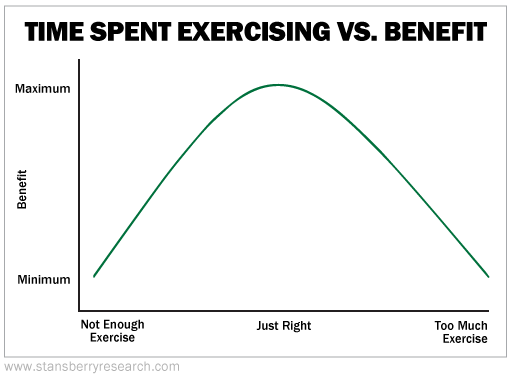Most folks lie about how much they exercise...
Even I've fibbed a little... I tell folks about my three marathons (and yes, I finished each of them) as if decades later I'm still hoofing out 60 miles a week in Central Park.
Our lies about exercise often come with good intentions. When the nurse or doctor asks how much exercise we're getting, we want to please them and our egos... Fibbing a little about what we wished we were doing is a good sign. At least you're aware that it's important, and you're imagining you're doing it.
But you're probably not fooling your doctor (or anyone else for that matter)...
According to the Office of Disease Prevention and Health Promotion, more than 80% of adults and adolescents in the U.S. don't get enough exercise. We seem to overestimate our own abilities and overlook our weaknesses.
Today, we're going to show you how easy it is to make exercise a regular part of your routine. It turns out, the amount of exercise you need weekly or daily is less than you think. And if you think about exercise like we do, the risks and benefits sit along a U-shaped curve... which means any little bit you can start doing (or adding to what you're already doing) will likely move you to a better place on the curve.

The minimum amount of exercise recommended for adults is considered to be 150 minutes a week, according to the World Health Organization. At just 22 minutes a day, that's shorter than an episode of your favorite TV show. You could even exercise while you watch.
Moderate exercise – like taking a brisk walk – for just 30 minutes a day has tremendous benefits for your general health. These include weight control, lower risk of heart disease and some cancers, blood sugar and insulin management, improved mental health and mood, stronger bones and muscles, better sleep, and improved sexual health.
But how do you know what amount of exercise is just right for you?
Your perfect amount of exercise can vary depending on your goals, your age, and your current physical health. But here is a great starting point... Aim to get 20 to 30 minutes of extra and focused movement every day. You can even break this time up into increments throughout the day. Go for a 10-minute walk after meals or take some time doing yoga. These are simple, low-impact ways to get in your exercise.
Do what I do and try to bike for 15 to 30 minutes every day with a 60- to 90-minute ride on the weekend. In between those days, I love spending 20 minutes dancing or strength training. This winter, I'm going to add a long and modestly paced walk in the middle of the day before lunch... and try to do it every day.
One of the best ways to make sure you are getting the exercise you need is to establish an exercise routine. Consistency is key when it comes to exercise. Creating an exercise calendar can help keep you on the right track to reach your fitness goals. You should place your calendar somewhere you'll see it (like on your fridge) to remind you to stick to your goals.
A great strategy for maintaining the right amount of exercise every week is to exercise with a buddy. Having an exercise support system can provide accountability, motivation, and some healthy competition. When choosing your workout partner, pick someone who has similar fitness goals and someone who you wouldn't want to disappoint.
I've always loved going to the gym with people more skilled than I am because they can teach me, motivate me, and are generally excited I'm learning from them. A workout buddy can help push you to do a little more at the gym and also normalizes the need for health and fitness behavior.
Talk with your partner about what your goals are. For example, is it to go on a 45-minute walk three times a week in the neighborhood? Or is it to lift weights five days a week for 20 minutes? Once you've agreed on your goals, start small and work slowly to meet them.
If you start working these tips into your life, you'll be in great shape and set up for good health.
What We're Reading...
- Five of the best exercises you can ever do.
- Something different: Cold water could hold a clue to a dementia cure.
Here's to our health, wealth, and a great retirement,
Dr. David Eifrig and the Health & Wealth Bulletin Research Team
November 12, 2020
